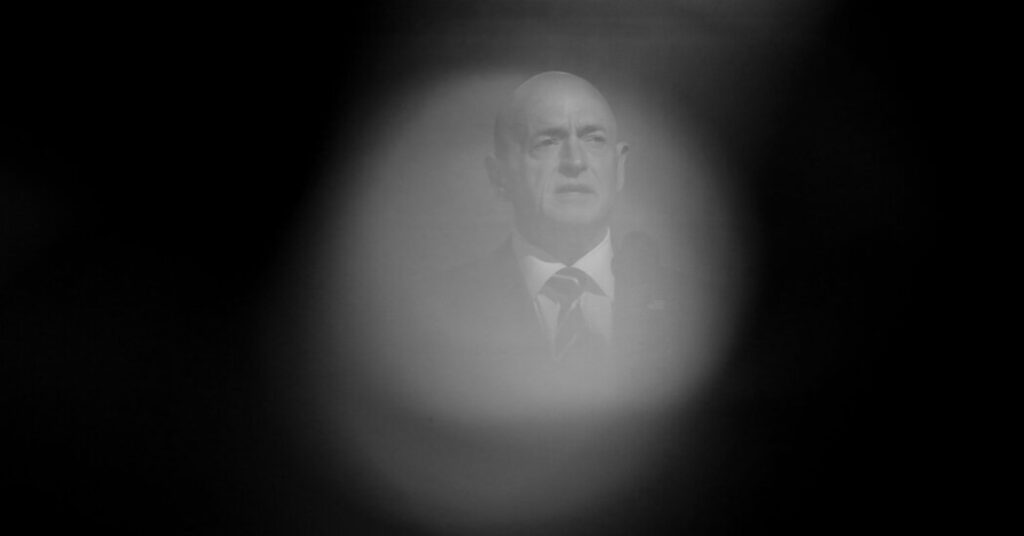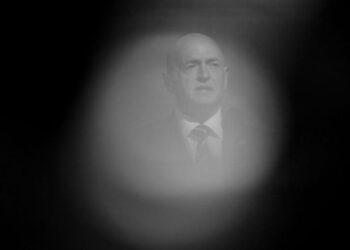On Monday, Pete Hegseth, the secretary of defense, directed the Pentagon to investigate Senator Mark Kelly, a retired Navy captain who flew combat missions during the gulf war and took several spaceflights as an astronaut before he was elected to serve Arizona’s citizens in Congress. His potential crime? Telling members of the armed services that they do not have to follow illegal orders. But saying so is not a crime; it’s a true statement of the law. And even if President Trump doesn’t like it, it’s protected by the First Amendment.
In a video released last week, Senator Kelly and several other Democratic lawmakers reminded members of the military that they “can refuse illegal orders.” That’s exactly right. “Following orders” is not a defense if you follow an illegal order to commit a war crime, as Allied prosecutors established at the Nuremberg trials of Nazis after World War II. Members of the military have not only the right, but the obligation, to refuse illegal orders.
The video enraged President Trump, who evidently likes his orders followed whether they are lawful or not. On Truth Social, he called the video “SEDITIOUS BEHAVIOR, punishable by DEATH!” He then reposted another person’s message that said, “HANG THEM GEORGE WASHINGTON WOULD!” Now his defense secretary has opened an investigation into whether Senator Kelly committed a military crime by saying what he did. And the F.B.I. has followed suit by seeking to question the six lawmakers in the video, all of whom served in the military or the intelligence service. (Senator Kelly alone is subject to military jurisdiction because he is “retired,” while the others did not serve long enough to be eligible to retire with a pension).
If anything is lawless here, it’s the investigations. The video itself mentioned no particular orders. On “Face the Nation,” Senator Kelly, a member of the Armed Services Committee, questioned the legality of the orders to kill suspected drug smugglers at sea. But on that point, he’s echoing what countless experts in the law of war have said. Even John Yoo, one of the former Justice Department officials who famously greenlighted the waterboarding of Al Qaeda suspects, has questioned the legality of the strikes, arguing that “the United States cannot confuse crime with war.”
It’s hard to find anyone outside Trump’s inner circle of yes-men and yes-women who considers the killings legal. The administration has notably declined to publicly disclose the memo that purports to advance a legal rationale for the strikes, which have already killed more than 80 people. Even if you are tried and convicted of smuggling drugs, you cannot be executed for that crime alone — much less by summary execution meted out from the air.
The notion that we are at war with drug smugglers confuses a metaphor for reality; the “war on drugs” is no more an armed conflict than the “war on cancer” is. In any event, during an actual armed conflict the laws of war prohibit targeting civilians who are not actively engaged in hostilities against us. Yet instead of conforming the military’s conduct to the law and halting the killings, the Pentagon is now investigating Senator Kelly, and the F.B.I. wants to question both the senator and his colleagues for doing nothing more than stating what the law is.
We’ve seen something like this before, but it’s not a precedent we should be proud of. During World War I, Congress made it a crime to incite insubordination in the military. More than 2,000 people were prosecuted for criticizing the war under this law, and about 1,000 were convicted. Several of these cases made their way to the Supreme Court, which upheld the convictions. Among those convicted was Eugene Debs, who ran for president as the Socialist Party candidate in 1920 while serving his sentence and received nearly a million votes.
In its decisions affirming the convictions, the Supreme Court reasoned, without a shred of convincing evidence, that the speakers posed, as Oliver Wendell Holmes, Jr. put it, a “clear and present danger” to the country. One defendant, Charles Schenck, had mailed leaflets to men who had been drafted, criticizing the war and urging them to “assert your rights.” Another, John Frohwerk, was convicted of writing a dozen news articles similarly criticizing the war effort. Debs was sentenced to 10 years for praising imprisoned critics of the war in a speech, among other things.
In none of the cases was any evidence offered that anyone had actually acted upon the criticisms, or that they had in fact incited insubordination. The mere possibility of interference with the war was enough.
Those decisions are now viewed as egregious missteps in the interpretation of the First Amendment. Today’s free speech doctrine looks instead to the dissents of Justice Holmes and Justice Louis Brandeis in Abrams v. United States and Gitlow v. New York, which argued that the First Amendment prohibits the government from censoring speech because it criticizes the government, and maintained that “the best test of truth is the power of the thought to get itself accepted in the competition of the market,” not whether it pleases government officials. Years of repression against union activists, communists and civil rights activists ultimately led the Supreme Court to adopt robust protections for free speech on matters of public concern — under which the prosecutions of World War I would all have been invalid.
As a result, it is now clearly established that I cannot be prosecuted for saying, in this essay, “Members of the military have not only the right, but the obligation, to refuse illegal orders.” Nor could I be prosecuted for stating, as I also have, that the orders to kill suspected drug smugglers are illegal. The First Amendment protects all such statements. Indeed, it protects explicit calls for illegal conduct unless the speech is both intended and likely to incite imminent illegality, a standard rarely met, and one not even approached by Senator Kelly’s words.
The administration maintains that it can investigate Senator Kelly because he is a retired naval officer. In other words, because he fought for his country — something Donald Trump managed to avoid doing — Senator Kelly has less First Amendment protection than the rest of us. That’s wrong.
It’s true that the Uniform Code of Military Justice applies to retired members of the military. On very rare occasions, retired members have been “called up” to stand trial in military court for violating the military code. The only code provision that addresses mere speech, however, is the rarely used Article 88, which prohibits officers from using “contemptuous words” against the president and other high-level officials. Nothing Senator Kelly said was remotely “contemptuous,” which a military judges’ manual defines as “insulting, rude, and disdainful.” Senator Kelly did not even mention the president or any other official; he simply described the law that governs service members.
The fact that Senator Kelly is a retired officer does not authorize an exception to the First Amendment. While restricting how officers speak about the president may make sense when applied to active-duty officers, where respect for the commander in chief and military discipline are paramount, it makes no sense when applied to a retiree who engages in no military activity and exercises no military authority.
Precisely because those exercising command authority are often limited in what they can say, it’s all the more important to protect the speech rights of those who have retired and can offer their perspective. Some of the most important voices questioning President Bush’s torture program in the “war on terror” were retired admirals and generals. Such officials rarely speak out on military matters, but when they do they deserve to be heard, not criminally investigated.
We ask a lot of those who put their lives on the line defending our nation. The least we can do is respect their free speech rights once they’ve retired.
David Cole is a visiting professor at Columbia Law School and a former national legal director of the A.C.L.U.
The Times is committed to publishing a diversity of letters to the editor. We’d like to hear what you think about this or any of our articles. Here are some tips. And here’s our email: [email protected].
Follow the New York Times Opinion section on Facebook, Instagram, TikTok, Bluesky, WhatsApp and Threads.
The post Mark Kelly Is Being Investigated for Telling the Truth appeared first on New York Times.




